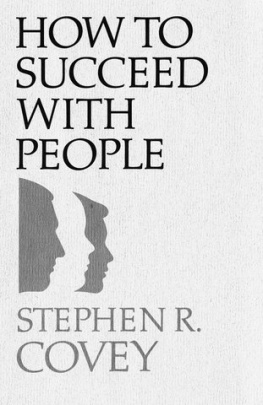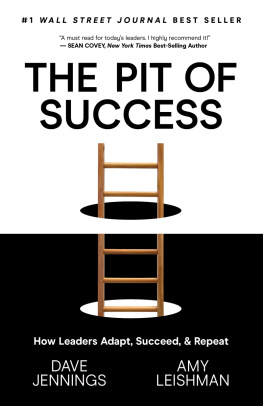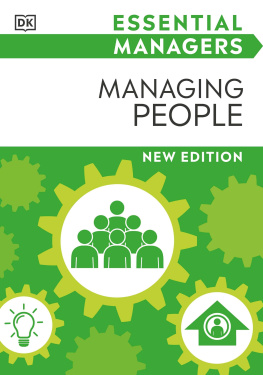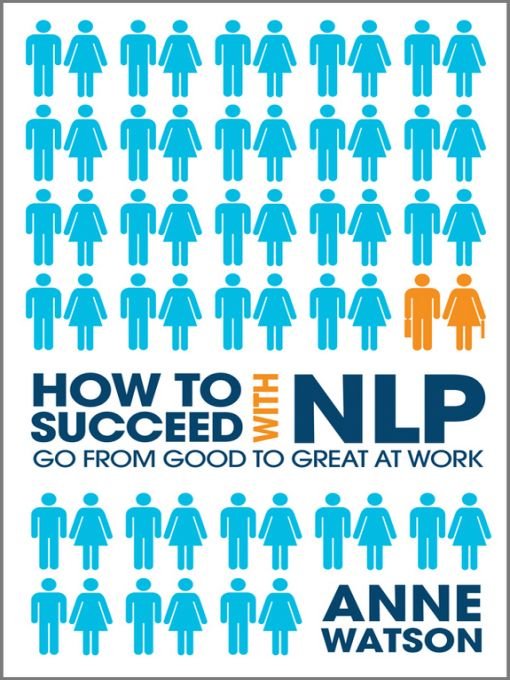Table of Contents
Dedicated to my brother, James Watson, Managing Partner of Watson Woodhouse, not only good but great.
Introduction
Success on our own terms would seem to be what we are all pursuing; the only question being what success actually means for you. Once you know what you want then you are already well on the way to achieving that success. You can then start to work out what small or large steps you need to take to get there.
No matter how good you are, you can always be better. This book will show you ways of working out what success means to you and then will help you to identify clear steps you need to take to get there. If you measure success in terms of personal development, promotion, tangible achievements, recognition, salary increases or other benefits, the way to win all of this is by adding and creating value in the job you are doing. How do you move from being good at work to being great? How would you like to become the greatest thing that ever happened to your boss and to your company? As soon as you become this prized asset then all the rewards that you hold to be important will follow on.
Practical advice that works is the theme for this book. Get ready for tips and techniques that will first of all help you define what success is to you and then the kind of effective examples that will help you as you move along the path from good to great.
This book will highlight common situations, dilemmas, challenges and problems in work and life and suggest different Neuro Linguistic Programming (NLP) based solutions that will give you just what you need to transform yourself. We will find out more about NLP in Chapter 1. But this is not a handbook to NLP; it is all about your success and ways to improve performance at work so that you are reenergized, in control and giving a sparkling performance in everything you do. All you need to know about the NLP techniques is that they will work.
The starting point here is to realize that successful people who are leaders in their field tend to be 100 % responsible for their own lives. What happens to them, what they achieve and where they are in life is underpinned by a fundamental belief that everything lies in their own hands and no one elses. These people do not have chips on their shoulders about their upbringing, their education or the hand that life has dealt them. They take what they have and through their own attitude and behaviour they create what they want.
Like twenty-three-year old Russian Alina Ibragimova, one of the worlds best violinists. Having been beset by wracked nerves prior to every concert and every performance, one day when she was twelve she decided that she would never be nervous again. And she wasnt. How would you like to know some fast, simple and effective techniques to eradicate the possible barriers to your success? Would you like to know some ways to gain that level of control over what happens to you and over your emotions? How can you make sure that your response to lifes events is the one that you want rather than the one you find yourself with?
Achieving what you want is something that needs to be worked at. Simply doing one thing right isnt enough to get to the next level. If you want to be successful at work you have to do a good job, be seen to be doing that good job, forge brilliant relationships with colleagues, customers and suppliers and you need to be sure that you are seen in the right light for the kind of promotion or reward you are looking for.
Personal relationships are important in work as well as in our personal lives, and if you want to pursue a lifes dream, then you need to be aware of the invisible and the unspoken.
Recognizing who you are and how you function is an essential starting point, and then you move on to understanding others. How do you get what you want out of your communication with others? How do you say what you mean, and make sure you understand what others are saying to you? How do you gain that flexibility and sharpness of focus that will mean you stop fighting shadows and instead bring into sharp relief the real issues that you need to address.
Reading this book will provide you with new and effective tools and techniques that will help improve your working relationships, make a positive impact on your career and deliver the ability to take control of your life, your communication, career and success. What is it that you want to improve in your working life? Do you want to earn more, get that next promotion, win a place on a prized development programme, be valued or just want a feeling of satisfaction that you are needed? All of this lies in your hands and your control; it is just a case of knowing how to do it.
Theres never a better time to leave the negative behind. Miserable thoughts, depressed attitudes, bad news and mutual moaning are addictive, corrosive and highly infectious. Lets make the starting point a positive one, as once you change your mind-set to one that is constantly looking out for the good points rather than the bad, you will suddenly find it more energizing and uplifting than complaining could ever be.
In an age where the ability to control your work life has spiralled out of control because of external events, the world of work has never been more challenging and changing. Traditionally, careers used to follow steady paths and relatively predictable routes. If you worked hard and stayed loyal to your employer, then stability and pay rises would follow. Of course, some businesses dont make the grade and people lose their jobs through no fault of their own but generally there seemed to be a natural law of cause and effect. The rules of engagement used to be that working hard would create a long career, culminating in the award of a pension. Those rules have changed so your behaviour has to change to match them.
The twenty-first century has seen a shift in attitudes by both employers and employees. Since the 90s, an eclectic career has increasingly come to be seen as acceptable and to have advantages. Businesses are changing and adapting more quickly than ever at all levels; in their structure and in the way they operate to deliver profitable results. A person who has spent their entire career with one company may be considered to be lacking in breadth as a company changes.
By the same token, individuals today can choose where they want to work and choose to leave if they dont like it. People who are seeking to achieve talk about quality of life and a good work life balance and will make tough decisions to leave a company if it is not satisfying at every level. However, this choice might seem to be restricted in difficult economic times, with the tightening of the credit market and the sudden and unrelenting pace of downsizing or rightsizing. Surely this must mean your choice is being limited by external circumstances and your ability to control what is happening is diminished? This book will show you that this is not the case, and that by taking responsibility for what happens to you, the opposite can happen. You will have control of your life and your career. In order to do this, you need the skills to take charge of your own destiny and the tools and strategies to use in the workplace to achieve success.














